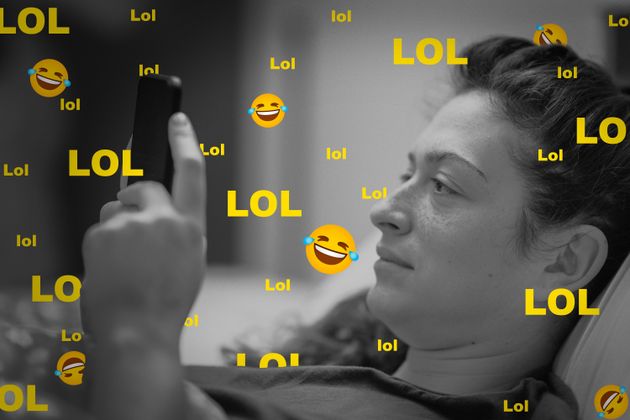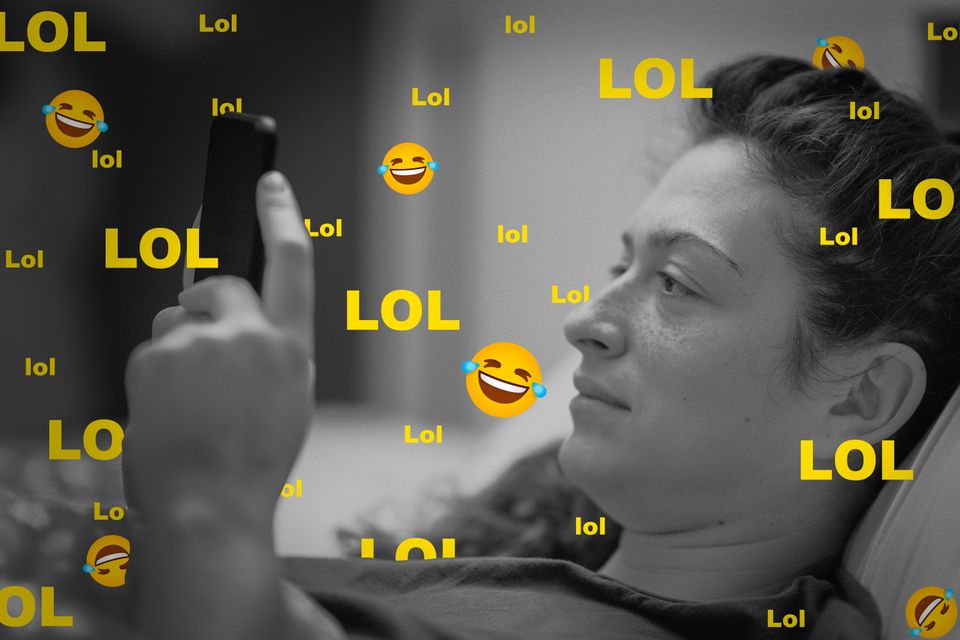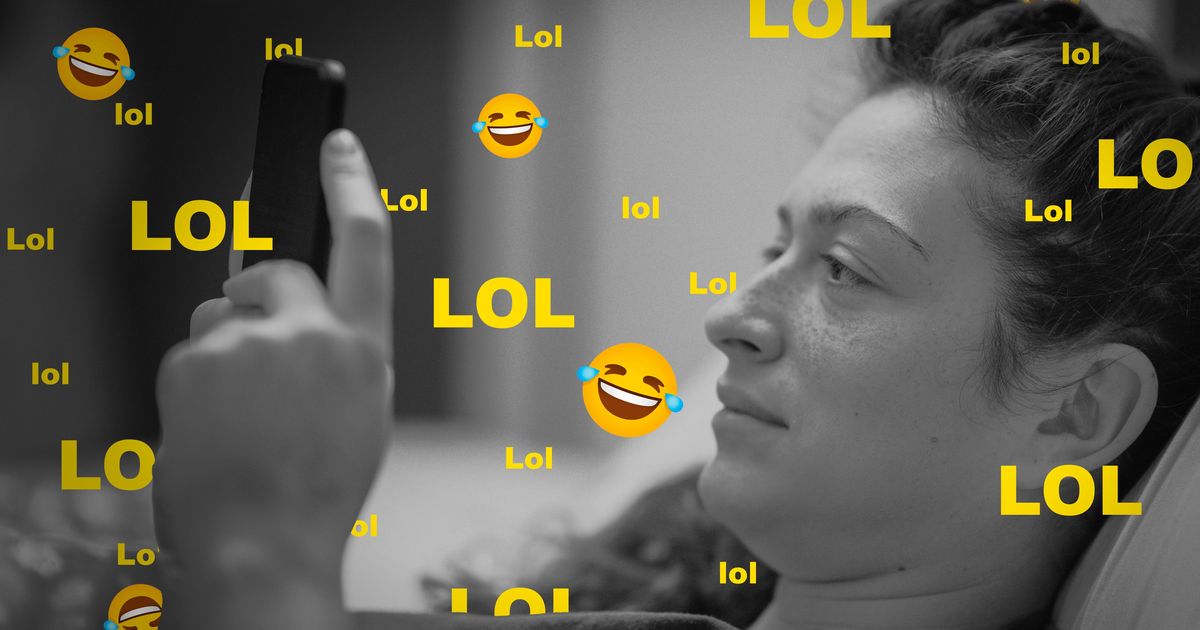When did “lol” become the equivalent of a punctuation mark for millennials?
Nick Russell, a millennial from Memphis, Tennessee, tacks “lol” onto texts to sidestep potentially awkward or loaded conversation.
“It’s the difference between texting ‘I think I love you’ to a crush versus ‘I think I love you, lol,‘” Russell said. “In the latter case, I could always rely on the old ‘just kidding!’”
Advertisement
“It helps lighten the internal tension I could be feeling about whatever I’m sending,” he added.
Rebecca Reynoso, a millennial from Chicago, deploys a breezy “lol” at the end of her work texts and chats to take the edge off any message. It’s a way to quickly establish tone; a “lol” tells her co-workers she’s “approachable” and “non-threatening.”
“It’s like a tension-breaking mechanism,” she told HuffPost.
It defuses the potential for hostility in personal relationships, too. “Could you wash the dishes, lol” to your spouse or roommate sounds a lot better than a coarse, curtly communicated, “Could you wash the dishes.” (If you hadn’t noticed, millennials and younger generations have killed off the question mark.)
“’Lol’ has been around for so long that its meaning evolved, like a Pokémon. And yet, it clearly belongs to the digital realm that some people still find confusing.”
– Daria Bahtina, a linguistics lecturer at the University of California, Los Angeles
Alex Liggett, a millennial from Pittsburgh, likens millennials’ “lol” overuse to “a scream at the state of the world.”
Advertisement
“My default mode is to feel that what I have to say isn’t important, so it’s also sort of a great eraser,” he said. “But I’ve transitioned to ‘haha’ instead of ‘lol’ because I read that ‘lol’ is millennial-coded.”
Let Gen Z and Gen Alpha scoff at “lol” all they want. Most millennials say if you want to take their “lol,” you’ll have to pry it from their cold, dead hands.
“Tone is just so hard to convey through text otherwise,” said Kashif Pasta, a director and writer who’s a millennial.
Too many emojis in texts can make you look unhinged. But you also don’t want to look like an ice queen. Even a simple, straightforward period at the end of a sentence feels too stern, Pasta said.
“In real-life conversations, we’d smile, subtly chuckle or laugh in moments that aren’t technically funny at all,” he said. “With ‘lol,’ we’re just going, ‘Hey … you’re safe.’”
Advertisement
The way Pasta sees it, millennials, those born between 1981 and 1996, are like the pilot generation for text and online messaging, having gone from an internet-free existence to an internet-centric one — and “lol” has been with them for most of that shift.
“We’re the exact right age to think of email as a proxy for physical mail and texting as a proxy for phone calls or in-person conversations,” he said. “We learned to text on T9 phones with texts that cost money and had character limits, so space was at a premium and we had to convey context as efficiently as possible.”
Here’s why linguists think millennials can’t stop ‘lol’-ing
Daria Bahtina, a linguistics lecturer at the University of California, Los Angeles, thinks “lol” is a true linguistic chameleon ― and used a truly millennial comparison to make her point.
“It’s been around for so long that its meaning evolved, like a Pokémon,” Bahtina told HuffPost. “And yet ‘lol’ clearly belongs to the digital realm that some people still find confusing.”
It started out as “laugh out loud,” but it’s long since transmogrified into a mark of humility and self-deprecation: “Don’t take this — or me — too seriously. I sure don’t.”
Advertisement
“For millennials, it’s a way to either make a neutral message warmer and more casual or a way to make a more negative message polite,” Bahtina said. “It’s like hedging or minimising a request with ‘no biggie if you disagree.’”

Images By Tang Ming Tung via Getty Images
In more academic terms, “lol” is what linguists like to call a discourse marker, said Anna-Marie Sprenger, a Ph.D. candidate in linguistics at the University of Chicago.
“A discourse marker is a little word or phrase that helps organise a thought or a chunk of conversation in a way that indicates the sort of ‘flavour’ of how the speaker or writer wants that bit of language interpreted by their interlocutor,” Sprenger told HuffPost.
In the English language, these can be cute interjections: “oh,” “well,” “so,” “you know” and “I mean.”
Advertisement
Interestingly, every once in a while, “lol” is explicitly passive-aggressive.
“For one project at UCLA, students observed that there’s been a mild increase of ‘lol’ as passive aggression,” Bahtina said. “They noticed more passive-aggressive tweets carrying ‘lol’ at the end rather than at the beginning or end of a sentence.”
Here’s why therapists think millennials cling so hard to ‘lol’
Now that we’ve gotten the linguistic breakdown, let’s delve deeper into the millennial psyche: What does it mean for a generation to feel so obligated to be self-deprecating and good-humoured all the time? Are they OK?
“I think using ‘lol’ after a sentence is a way to laugh things off when you fear burdening others, which is such a prominent worry of our generation,” said Lindsey Gallop, a therapist at CZ Therapy Group in Denver.
Jordan Kurtz, also at CZ Therapy Group, looks at “lol” as a way to get some distance between yourself and any knotty emotional content. Vulnerability is scary, especially over text.
“It’s the difference between ‘I’m having a hard day today’ and ‘I’m having a hard day today, lol,’” Kurtz said. “With the former, personal struggle is allowed to have gravity.”
Advertisement
Maya Nehru, a millennial marriage and family therapist in Los Angeles, said she’s noticed two common, generational themes that might be driving “lol” overuse: the fear of loss and the anxiety around being judged and culturally cast off.
“We millennials have lived through a period of enormous change and disruption on many levels. It’s what defines us, and with change comes loss to some degree,” Nehru said. “Perhaps adding ‘lol’ to texts is the millennial’s way of protecting themselves from potential loss ― maybe we’re trying to save face.”
Plus, millennials have grown up alongside social media, where criticism and judgment are rampant and the potential to be dragged is ever present.
“I think the ‘lol’ is a behaviour that subconsciously eases our anxiety around being liked, belonging and maintaining our sense of self,” Nehru said.

Luis Alvarez via Getty Images
Advertisement
Women are probably more likely to use it, too, said Kelly McKenna, a therapist in New York City.
“Many millennials, especially women, are constantly worrying about other people’s feelings and trying to manage other people’s reactions to anything they say or do,” she said. “By adding ‘lol,’ it helps lighten the mood and hopefully reduces the risk you might upset someone by communicating assertively.”
Whatever the reasons for the “lol” reflex, linguists say it’s impressive how much heavy lifting those three little letters do.
Earlier generations might have considered digital communication as a “lean media” — insufficient for conveying the depth of our thoughts and feelings and lacking the warmth of face-to-face communications ― but Bahtina said that millennials “have long defied this notion.”
“Younger generations are so adept at using a dynamic mix of punctuation, capitalization, creative respellings, special symbols, abbreviations and emojis,” she said. “Millennials found a way to transport the richness of human expression into the realm of texts and tweets, crafting a language that is just as expressive and nuanced as face-to-face conversation.”








